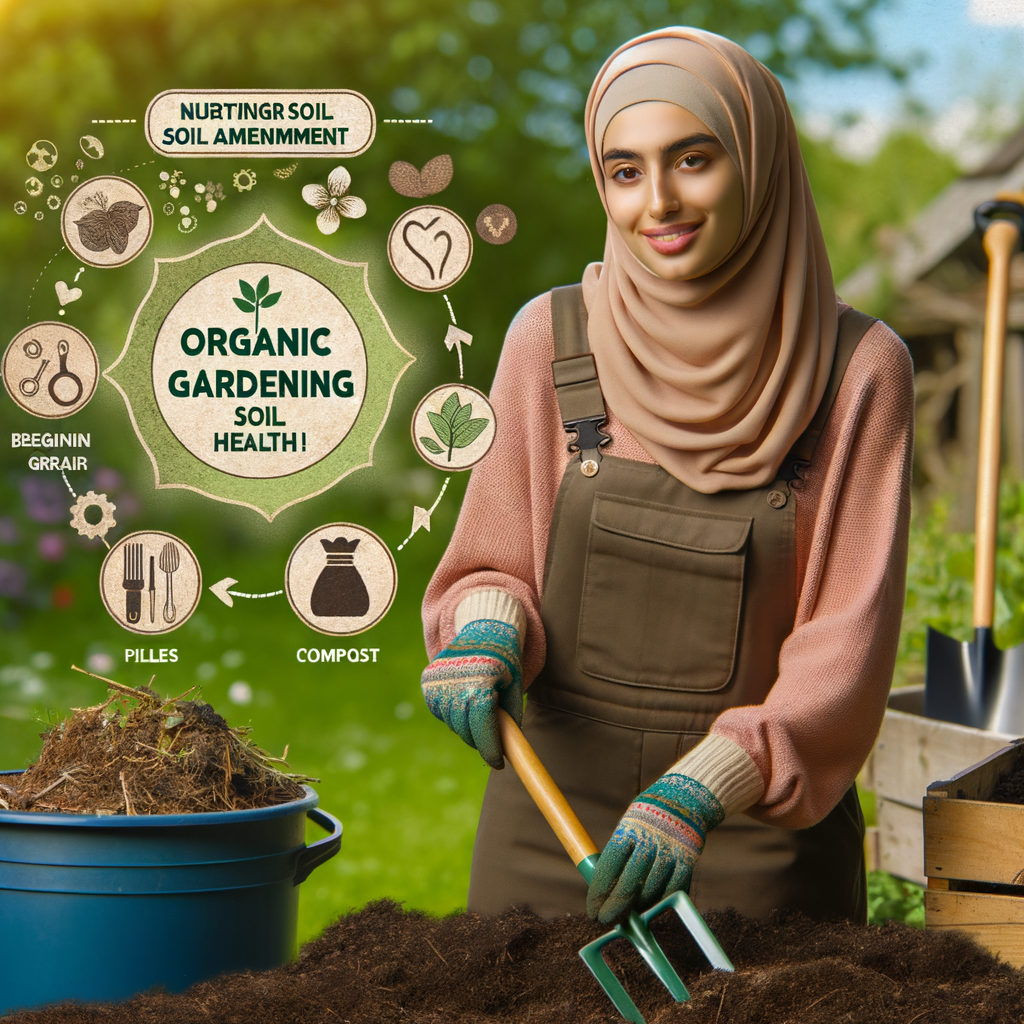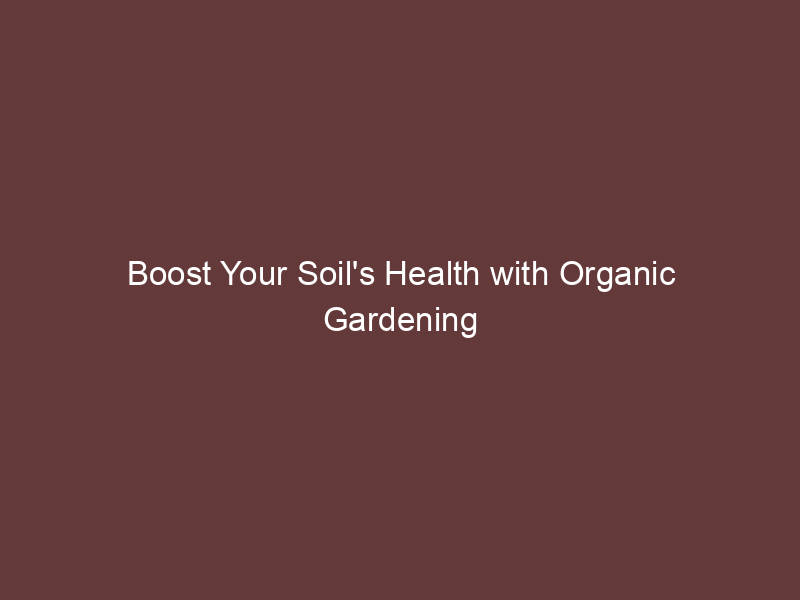
Introduction to Organic Gardening
Welcome to the world of organic gardening! This method of gardening is not only beneficial for our health, but also for the environment. Let’s dive in to understand what organic gardening is and why it’s so beneficial.
-
Definition of Organic Gardening
Organic gardening is a method of growing plants without the use of synthetic fertilizers and pesticides. Instead, it relies on natural processes and materials to nurture plants and manage pests. This method of gardening is all about working with nature, not against it. It promotes biodiversity, improves soil health, and creates a sustainable ecosystem in your garden. For more detailed information, you can visit Wikipedia’s page on organic gardening.
-
Benefits of Organic Gardening
Organic gardening has numerous benefits, not just for us, but also for our environment. Here are some key benefits:
- Healthier Produce: Organic gardening eliminates the use of harmful chemicals, resulting in healthier, nutrient-rich produce.
- Environmental Sustainability: Organic gardening practices contribute to environmental sustainability by reducing pollution and promoting biodiversity.
- Improved Soil Health: Organic gardening enhances soil fertility and promotes a healthy ecosystem in your garden.
- Economic Benefits: Organic gardening can save money in the long run as it reduces the need for expensive synthetic fertilizers and pesticides.
These are just a few of the many benefits of organic gardening. As we delve deeper into this topic, we will explore more about how you can start your own organic garden and maintain healthy soil organically.
Organic Gardening Tips for Beginners
Embarking on your organic gardening journey can be both exciting and a bit overwhelming. To help you get started, here are some essential tips that will guide you towards a successful organic garden.
- Choosing the right plants
- Understanding your soil
- Composting for nutrient-rich soil
Choosing the right plants for your organic garden is the first step towards success. It’s important to select plants that are suitable for your climate and soil type. This will ensure that your plants thrive and produce a bountiful harvest. For instance, tomatoes love warm, sunny climates while lettuce prefers cooler temperatures. Here is a list of common garden plants and their preferred growing conditions. Remember, healthy plants are more resistant to pests and diseases, reducing the need for chemical interventions.
Soil is the lifeblood of your organic garden. Understanding your soil type and its needs is crucial for growing healthy plants. There are three main types of soil: sandy, clay, and loamy. Each type has its own set of characteristics and nutrient needs. For example, sandy soil drains quickly but doesn’t hold nutrients well, while clay soil retains water but can become compacted. You can determine your soil type by feeling it or conducting a simple jar test. Once you know your soil type, you can tailor your gardening practices to meet its specific needs.
Composting is a fantastic way to enrich your soil and promote plant growth. It involves recycling organic waste like vegetable scraps, leaves, and grass clippings into a nutrient-rich soil conditioner. Composting not only provides essential nutrients to your plants but also improves soil structure, promotes beneficial soil microbes, and reduces waste. To start composting, simply create a compost pile or bin in a shaded area of your garden and add your organic waste. Turn the pile regularly to speed up the decomposition process and before long, you’ll have a supply of rich, dark compost to feed your garden. Here is more information on how to start composting.
Organic gardening is a rewarding endeavor that brings numerous benefits to both the gardener and the environment. By choosing the right plants, understanding your soil, and composting, you can create a thriving organic garden that produces healthy, delicious produce. Happy gardening!
Healthy Soil Cultivation
Healthy soil is the foundation of any successful garden. It provides the nutrients that plants need to grow and thrive. Cultivating healthy soil is a process that involves a variety of techniques, including the use of organic fertilizers, crop rotation, and the implementation of cover crops.
Natural Gardening Techniques
There are several natural gardening techniques that can help improve the health of your soil. Here are a few key methods:
- Using Organic Fertilizers: Organic fertilizers are made from natural materials like compost, manure, and bone meal. They are a great way to add nutrients to your soil without using synthetic chemicals. Organic fertilizers release nutrients slowly, providing a steady supply of nutrients to your plants. They also improve the structure of the soil, making it easier for plants to take up nutrients. Learn more about organic fertilizers here.
- Practicing Crop Rotation: Crop rotation is a technique where different crops are planted in the same area in sequential seasons. This helps to prevent the build-up of pests and diseases that can occur when the same crop is planted in the same place year after year. It also helps to improve soil fertility, as different crops have different nutrient requirements. Find out more about crop rotation here.
- Implementing Cover Crops: Cover crops are plants that are grown to cover the soil rather than for the purpose of being harvested. They help to prevent soil erosion, improve soil structure, and add organic matter to the soil. Some common cover crops include clover, rye, and vetch. Discover more about cover crops here.
By implementing these natural gardening techniques, you can cultivate healthy, fertile soil that will support your plants and help them to thrive. Remember, the key to a successful garden starts with the soil!
Organic Soil Improvement
Improving the quality of your soil organically is a crucial aspect of successful gardening. It not only enhances the growth and health of your plants but also contributes to the overall sustainability of the environment. Here, we will explore some effective techniques for organic gardening that can significantly improve your soil’s health.
Techniques for Organic Gardening
Organic gardening involves using natural methods to enhance the fertility of the soil and promote healthier plant growth. Here are some techniques that you can implement:
- Mulching for Moisture Retention
- Adding Organic Matter to Improve Soil Structure
- Encouraging Beneficial Soil Organisms
Mulching is a technique that involves covering the soil surface with organic materials such as straw, leaves, or compost. This helps to retain soil moisture, suppress weeds, and improve the soil structure. According to a study, mulching can increase soil moisture levels by up to 25%.
Adding organic matter like compost, manure, or leaf mold to your soil can significantly improve its structure and fertility. Organic matter helps to loosen compacted soil, improve drainage, and provide essential nutrients to your plants. A report suggests that adding organic matter can increase the soil’s nutrient-holding capacity by up to 20%.
Beneficial soil organisms such as earthworms, bacteria, and fungi play a crucial role in improving soil health. They help to break down organic matter, improve soil structure, and increase nutrient availability. You can encourage these organisms by adding organic matter and avoiding synthetic pesticides. According to a study, soils rich in beneficial organisms can support plant growth up to 50% more than soils without them.
By implementing these organic gardening techniques, you can significantly improve your soil’s health and productivity, leading to healthier and more robust plants. Remember, a healthy soil is the foundation of a successful garden.
Gardening for Healthy Soil
Healthy soil is the foundation of a thriving garden. It provides the necessary nutrients for plants and helps them grow strong and healthy. In this section, we will explore three key aspects of maintaining healthy soil: understanding the importance of soil pH, managing soil compaction, and preventing soil erosion.
- Understanding the Importance of Soil pH
- Managing Soil Compaction
- Preventing Soil Erosion
Soil pH is a measure of how acidic or alkaline your soil is. It affects the availability of nutrients to your plants and the activity of soil organisms. Most plants prefer a pH between 6.0 and 7.0. You can test your soil’s pH with a simple kit from your local garden store. If your soil is too acidic or alkaline, you can adjust it with lime or sulfur respectively. Learn more about soil pH here.
Soil compaction occurs when the soil particles are packed together tightly, reducing the pore space between them. This can prevent roots from growing, reduce water infiltration, and decrease soil aeration. To manage soil compaction, avoid walking on your garden beds, use a garden fork to loosen the soil, and add organic matter like compost or aged manure to improve soil structure. Find out more about soil compaction here.
Soil erosion is the removal of the topmost layer of soil, often due to water or wind. This can lead to loss of nutrients and poor plant growth. To prevent soil erosion, plant ground cover plants, build terraces if your garden is on a slope, and use mulch to protect the soil surface. Discover more about soil erosion here.
In conclusion, maintaining healthy soil is crucial for successful gardening. By understanding and managing these three aspects, you can ensure your garden soil is in the best possible condition for your plants to thrive.
Organic Gardening Soil Preparation
One of the most crucial steps in organic gardening is preparing the soil. The health of your plants largely depends on the quality of the soil they grow in. Here, we will guide you through the steps to prepare your soil for organic gardening.
Steps to Prepare Soil for Organic Gardening
Organic gardening requires a bit more effort than traditional gardening, but the results are well worth it. Here are the steps to prepare your soil:
- Testing the Soil
- Amending the Soil
- Preparing Raised Beds
Before you begin, it’s important to test your soil. This will give you a clear understanding of its current state and what amendments it might need. You can either purchase a soil testing kit from your local garden center or send a sample to a soil testing lab. The test will reveal the soil’s pH level, nutrient content, and organic matter content. Ideally, the pH should be between 6 and 7 for most plants. More about soil testing.
Once you’ve tested your soil, the next step is to amend it based on the results of the test. If your soil is too acidic or alkaline, you can adjust the pH by adding lime or sulfur respectively. To increase the nutrient content, you can add organic matter like compost or well-rotted manure. This will not only provide nutrients but also improve the soil structure and water-holding capacity. More about soil amendment.
Finally, you can prepare raised beds for your plants. Raised beds are beneficial as they improve drainage, prevent soil compaction, and allow for deeper root growth. To prepare a raised bed, first, mark out the area, then remove any existing grass or weeds. Next, add a layer of cardboard or newspaper to suppress weeds, followed by a layer of compost or well-rotted manure. Finally, add a layer of topsoil mixed with compost. More about raised beds.
By following these steps, you can create a fertile and healthy soil environment for your plants to thrive in. Remember, organic gardening is a continuous process of learning and adapting, so don’t be discouraged if things don’t go perfectly the first time. Happy gardening!
Maintaining Soil Health Organically
Organic gardening is not just about avoiding synthetic pesticides and fertilizers. It’s also about maintaining and improving the health of your soil naturally. Here are some key methods to achieve this:
- Regular Soil Testing
- Adding Compost and Organic Matter Regularly
- Using Organic Pest Control Methods
Regular soil testing is a crucial part of maintaining soil health organically. It helps you understand the nutrient content and pH level of your soil. This information is essential for determining what amendments your soil needs to provide the best environment for your plants. You can purchase soil testing kits online or from your local garden center. For a more comprehensive analysis, consider sending a soil sample to a laboratory. For more information on soil testing, visit Wikipedia’s page on Soil Testing.
Adding compost and organic matter to your soil regularly is another key method for maintaining soil health. Compost adds nutrients to the soil and improves its structure, allowing it to retain water more effectively. Organic matter, such as leaf mold and well-rotted manure, can also improve soil fertility and structure. Remember, a healthy soil is teeming with beneficial microorganisms that help plants absorb nutrients, so keep feeding your soil with organic matter!
Finally, using organic pest control methods can help maintain soil health. Synthetic pesticides can harm the beneficial organisms in your soil, disrupting its natural balance. Organic pest control methods, on the other hand, are less harmful to these beneficial organisms. These methods include using beneficial insects, like ladybugs and lacewings, to control pests, and using natural pesticides, like neem oil and diatomaceous earth. For more information on organic pest control, you can visit Wikipedia’s page on Organic Pest Control.
By following these methods, you can maintain and improve the health of your soil organically, providing a thriving environment for your plants and contributing to a healthier planet.
Conclusion: The Impact of Organic Gardening on Soil Health
As we wrap up our discussion on organic gardening, it’s crucial to understand the profound impact it has on soil health. Organic gardening not only provides us with healthier produce but also contributes significantly to the overall health of our environment. Let’s summarize the key points we’ve covered and encourage the continued practice of organic gardening.
- Summary of key points:
- Encouragement for continued organic gardening practices:
Organic gardening is a practice that involves the use of natural methods to grow plants. It excludes the use of synthetic fertilizers and pesticides, focusing instead on techniques such as composting, crop rotation, and biological pest control. The benefits of organic gardening are numerous, ranging from improved soil health and biodiversity to reduced pollution and healthier produce. Organic gardening enriches the soil with essential nutrients, promotes a balanced ecosystem, and helps in the conservation of water. Read more on Organic Gardening here.
As gardening enthusiasts, we have a responsibility towards our environment. By continuing to practice organic gardening, we can contribute to the health of our soil and the planet. Remember, every small step counts. Whether it’s composting kitchen waste, using natural pest control methods, or practicing crop rotation, each action contributes to a healthier and more sustainable world. Let’s continue to cultivate our gardens organically, nurturing not just our plants, but the soil and the ecosystem as a whole.
As we conclude, remember that the health of our soil is in our hands. Organic gardening is not just a hobby, but a commitment to the environment. Let’s continue to garden organically, for the health of our soil, our food, and our planet.






